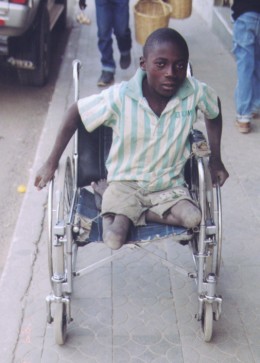 The world of medical missions has changed dramatically since Mother Teresa left for India in 1929. Nevertheless, today some 3 billion people still have no access to even the most basic health necessities. One of these is Jose Santos, pictured here in Angola. As an infant he was never vaccinated against polio and tragically acquired the infection. Jose’s legs became paralyzed and will never walk again.
The world of medical missions has changed dramatically since Mother Teresa left for India in 1929. Nevertheless, today some 3 billion people still have no access to even the most basic health necessities. One of these is Jose Santos, pictured here in Angola. As an infant he was never vaccinated against polio and tragically acquired the infection. Jose’s legs became paralyzed and will never walk again.
But just as disease remains abundant, so too are good-hearted people who want to help. Four hundred eight of them gathered in May for the Exploring Medical Missions Conference. Among these were representatives of 35 international medicine bodies who met together to analyze the future of health in developing nations. These leaders noted five trends that impact the role of anyone connected with international health service:
• Better disaster preparedness – Recent hurricanes, earthquakes, floods and famine are prompting health professionals to become more equipped to take action. RESPONSE: INMED will host the Disaster Medicine Management Symposium on October 3, 2008 to sharpen skills for community-wide health crises.
• More health profession students interested in medical missions – These enthusiastic people should be encouraged to nurture their sense of selfless service. Yet they also need adequate supervision and logistical support. RESPONSE: INMED is expanding the number of Training Sites for the INMED International Certificate Programs.
• Movement toward non-institutional forms of medical care – Clearly, community-based, public health-focused efforts are more effective in promoting overall health. RESPONSE: INMED is updating the on-line International Medicine Course to reflect the emphasis on efficient health development in low-resource settings.
• More health professionals interested in short-term missions opportunities – We should deliberately encourage such individuals. Beyond the momentary good that results, these are the very people who later make longer-term commitments. RESPONSE: Look for an emphasis on short-term service opportunities at the next Exploring Medical Missions Conference on May 29-30, 2009.
• Medicine as a mode of expressing good will – Health care is particularly effective in building relationships between peoples estranged from one another. RESPONSE: INMED is particularly recruiting medical professionals to hone their servant skills in Bach Christian Hospital in Pakistan and Hope Medical Group in Macau, China.
Impoverished people, like Jose Santos, can often be protected, cured, and even rehabilitated. All it takes are health professionals willing to expand their skills and broaden their hearts. Please join INMED this year in exploring your own role in medical missions. You may find yourself in good company along with an ever-growing number of your colleagues. You may also find some resonation with Mother Teresa’s conviction that, “We can do no great things, only small things with great love.”
